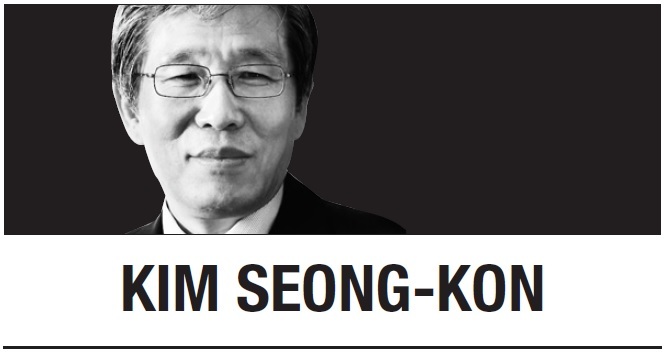[Kim Seong-kon] Finding our way ‘back to the Republic of Korea’
By Kim Seong-konPublished : April 20, 2022 - 05:30

Many people in Korea thought that something was not quite right for the past five years.
Among other things, our political leaders seemed to be indifferent or even unaware of what is actually going on in the world, and thus do not have a global mindset. For example, recently in an online speech, Volodymyr Zelenskyy, president of Ukraine, appealed to the world to support Ukraine against the recent invasion by Russian troops. Yet, according to newspaper reports, only 50 South Korean National Assembly members were in the hall to watch it, while approximately 240 lawmakers were absent. In other countries, however, it was standing room only. Newspaper reports said that in Japan, for example, about 500 lawmakers and political leaders enthusiastically watched Zelenskyy’s speech.
It was a shame that our political leaders neglected to attend such an important world event. They were seriously devoid of compassion, care, or a sense of responsibility, not to mention a global perspective.
Did our politicians forget that when North Korea invaded the South in 1950, South Korea was only able to survive thanks to the invaluable military and financial assistance from other countries?
How, then, could South Korea be apathetic to the unfolding tragedy of Ukraine, and stand by complacently as it is invaded by another country? How, do we suppose, would other countries respond when it is our turn to ask for help, in case a belligerent neighboring country might choose to invade our nation in the future?
The Korean people also find it wrong that some politicians denied the authenticity of the Republic of Korea, condemning our first president as if he were a pro-America, pro-Japan national traitor. Although without intending it, such a distorted viewpoint is liable to encourage North Korea to think that it is the rightful heir to the Korean Peninsula.
Presumably, the left-wing Moon administration thought that after the liberation, the right-wing pro-Japan people unjustly ousted the left-wing anti-Japan people from the political arena. Accordingly, the Moon administration has been hunting for the ghosts of pro-Japan people who died a long time ago, thus continuing to fuel anti-Japanese sentiment when this is disadvantageous to our diplomatic efforts. Consequently, South Korea’s relationship with Japan has deteriorated significantly.
We do hope that South Korea’s relationship with Japan could go back to normal with the Yoon Suk-yeol administration. However, that prospect is not necessarily rosy. Recently, a Japanese intellectual wrote to me, “Asked about Japan-Korea relations, 76 percent think it will remain the same, only 17 percent thinks it will be better than now with the new administration.” The poll leaves us heavy-hearted. Sometimes, going “back to normal” is not as easy as it seems, or might even be impossible. Once we have damaged or lost our credibility, our relationships inevitably become problematic and cannot recover completely.
Another problem is that our relationship with Japan directly affects our relationship with the US. If we do not get along well with Japan, our alliance with the US will be in jeopardy, too. That is exactly what North Korea and China want. If so, it is not a good path for South Korea. Perhaps we should be more generous and flexible, focus on what we can do together in the future, instead of clinging to a past that we cannot alter.
The people also thought that it was wrong that our left-wing politicians tried to erase “liberal” from “liberal democracy” in our Constitution and secondary school textbooks. It was problematic because it was an attempt to alter our national identity. The radical politicians seemed to prefer “direct democracy” or a “people’s democracy,” instead. However, a “people’s democracy” was what authoritarian socialist countries pursued when this label was attached to their countries’ names.
The plain truth of it is that many people have become disillusioned with the left-wing politicians who fought against the right-wing military dictatorship in the 1980s, only to now end up resembling the tyrants they once abhorred so much. Perhaps our politicians have become the monster themselves while fighting the monster, despite Nietzsche’s admonishment.
Looking back upon the past, the Korean people came to realize that a group of radical left-wing activists in our society paralyzed the right-wing Lee Myung-bak administration with groundless rumors of mad-cow disease from the US and overthrew the Park Geun-hye administration with the Choi Soon-sil scandal.
Now, the people worry about the possibility that those radical groups may be plotting another scheme to topple the Yoon administration soon after his inauguration. It would be wrong if that evil cycle continues. Now, those times are over and the people would no longer allow or tolerate such political demagoguery.
We hope the Yoon administration can straighten out those problems of the previous administration and return the good old Republic of Korea safe and sound.
Kim Seong-kon
Kim Seong-kon is a professor emeritus of English at Seoul National University and a visiting scholar at Dartmouth College. The views expressed here are his own. -- Ed.






![[KH Explains] How should Korea adjust its trade defenses against Chinese EVs?](http://res.heraldm.com/phpwas/restmb_idxmake.php?idx=644&simg=/content/image/2024/04/15/20240415050562_0.jpg&u=20240415144419)











![[Today’s K-pop] Stray Kids to return soon: report](http://res.heraldm.com/phpwas/restmb_idxmake.php?idx=642&simg=/content/image/2024/04/16/20240416050713_0.jpg&u=)